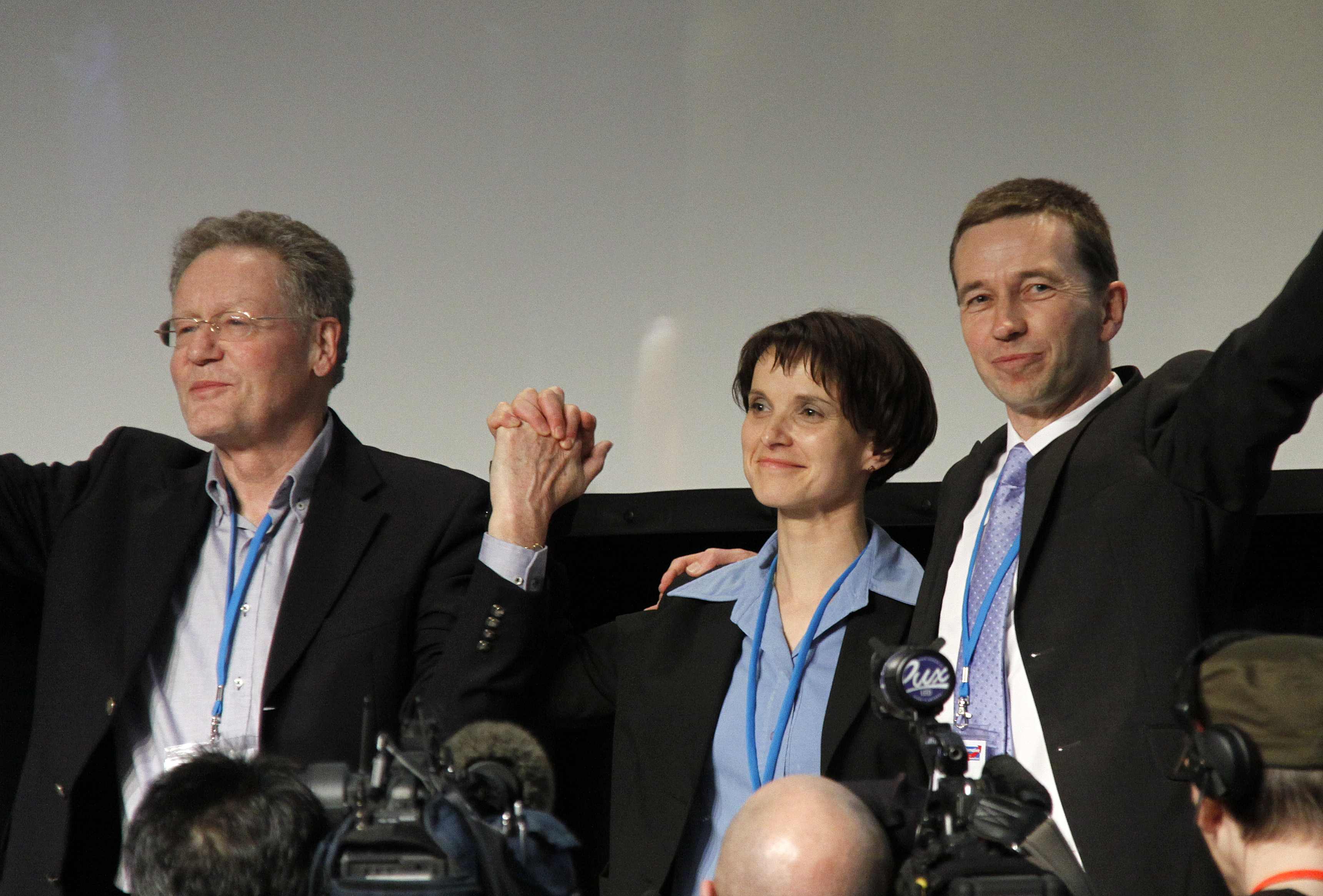
Alternative for Germany
 Alternative for Germany (, AfD, ) is a far-right, right-wing populist, national conservative, The party is sometimes referred to as right-wing populist or national conservative, particularly in the press, but these designations have not received much support from academics, who describe them as euphemistic.}} and völkisch nationalist political party in Germany. It has 151 members of the Bundestag and 15 members of the European Parliament. It is the largest opposition party in the Bundestag and is a member of the Europe of Sovereign Nations Group in the European Parliament.
Alternative for Germany (, AfD, ) is a far-right, right-wing populist, national conservative, The party is sometimes referred to as right-wing populist or national conservative, particularly in the press, but these designations have not received much support from academics, who describe them as euphemistic.}} and völkisch nationalist political party in Germany. It has 151 members of the Bundestag and 15 members of the European Parliament. It is the largest opposition party in the Bundestag and is a member of the Europe of Sovereign Nations Group in the European Parliament.Its name reflects its resistance to the mainstream policies of Angela Merkel and her slogan (, a German version of "there is no alternative"). Established in April 2013, AfD narrowly missed the 5% electoral threshold to sit in the Bundestag during the 2013 federal election. The party won seven seats in the 2014 European Parliament election in Germany as a member of the European Conservatives and Reformists (ECR). After securing representation in 14 of the 16 German state parliaments by October 2017, AfD won 94 seats in the 2017 federal election and became the third-largest party in the country, as well as the largest opposition party; its lead candidates were the co-vice chairman Alexander Gauland and Alice Weidel, the latter having served as the party group leader in the 19th Bundestag. In the 2021 federal election, AfD dropped to being the fifth-largest party in the 20th Bundestag. Following the 2025 federal election, it became the second-largest party and the largest opposition party in the 21st Bundestag.
AfD was founded by Gauland, Bernd Lucke, and former members of the Christian Democratic Union of Germany (CDU) to oppose the policies of the Eurozone as a right-wing and moderately Eurosceptic alternative to the centre-right but pro-European CDU. The party presented itself as an economically liberal, Eurosceptic, and conservative movement in its early years. AfD subsequently moved further to the right, and expanded its policies under successive leaderships to include opposition to immigration, Islam, and the European Union. Since 2015, with the beginning of the refugee crisis in Europe, AfD's ideology has been characterised by German nationalism, Völkisch nationalism, right-wing populism, and national conservatism. It has a policy focus on opposing Islam, opposing immigration into Germany, especially Muslim immigration into Germany, welfare chauvinism, Euroscepticism, denial of human-caused global warming, and supporting closer relations with Russia.
Several state associations and other factions of AfD have been linked to or accused of harbouring connections with far-right nationalist and proscribed movements, such as PEGIDA, the , and the Identitarian movement, and of employing historical revisionism, as well as xenophobic rhetoric. They have been observed by various state offices for the protection of the constitution since 2018. AfD's leadership has denied that the party is racist and has been internally divided on whether to endorse such groups. In January 2022, after a failed power struggle, party leader Jörg Meuthen resigned his party chairmanship with immediate effect and left AfD, stating that the party had moved far to the right with totalitarian traits and in large parts was no longer based on the liberal democratic basic order. Lucke had left the party in 2015 with a similar view.
AfD is the strongest in the areas of the former communist German Democratic Republic (East Germany), especially the states of Saxony and Thuringia, largely due to economic and integration issues that continue to persist post-reunification, in addition to the East German voters' perceived propensity for strongman rule. In the 2021 federal elections, AfD fell from third to fifth place overall but made gains in the eastern states (the former East Germany). In the former East Berlin, it came in second after SPD with 20.5% of the vote; in the west, it came in fifth with 8.4% of the vote. In the 2025 German federal election, AfD received record 20.8% of the vote and ended on second place behind CDU/CSU.file:bad Provided by Wikipedia
1
Published: Berlin : Alternative für Deutschland, 2016.
Other Authors:
“...Alternative für Deutschland...”
Book
2
3
Published: Wiesbaden : Springer VS, 2016
Other Authors:
“...Fachtagung Politische Programmatik und Entwicklung der Partei "Alternative für Deutschland" (2015...”Inhaltsverzeichnis
Book

